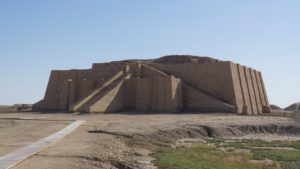What Was Going on in Babel?
 You will find the story in Genesis 11, and it is a case study in the sin-born desire in mankind to make a way to heaven without God. If they can. Here’s what we see in the text.
You will find the story in Genesis 11, and it is a case study in the sin-born desire in mankind to make a way to heaven without God. If they can. Here’s what we see in the text.
They were united. The whole earth was united by one language, which is wonderful, and will happen again in the Kingdom of God. But they moved to the plain of Shinar and there decided they would build something that would give them access into heaven. “Come, let us make bricks,” they said. And then, “Come, let us build ourselves a tower.” And finally, “let us make a name for ourselves.” So, we see that they had ambition, which is not bad. And that they were industrious, working to build something magnificent, which is not bad! God is not against industry and innovation, creativity and art. He is the creator of all of that. And we see that there was unity, which God is certainly not opposed to; he gives us grace to attain it. He wants unity for his children. So, what is the problem? It is not in what they proposed to do but in their motivation. It was two-fold, based on pride and fear.
Pride is preeminent when anyone or any group gathers to do something or build something apart from God, especially when the endgame is to build something that will exalt humanity or even save humanity. John Witherspoon was president of Princeton University when James Madison, who would become the 4th president of the United States, was a student there. Witherspoon was often quoted by Madison later as having said, “Accursed be all that learning which sets itself in opposition to the cross of Christ!” That’s the idea here. Whether it is a school or a business or a nation, or an individual, or even a church, any person or group that exalts its own desires to make a name for itself above the plan and purposes of God is headed for a fall. God’s purpose will stand.
Charles Spurgeon said, “It does not matter whether 50,000 espouse its cause, or only five, or only one. Truth does not reign by the ballot box, or by the counting of heads: it abides forever. All the tongues of men and of angels cannot make truth more true; and all the howlings of devils and doubters cannot transform it into a lie. Glory be to God for this!”
I remember a man telling me years ago that he has a plaque on his desk at work that asks him the same question every day: “What’s your motivation?” It’s a great question. The primary motivation of the people of Babel was pride.
They were also motivated by pride’s companion: fear. They wanted to find security by making a name for themselves, verse 4, “lest we be dispersed over the face of the whole earth.” Ignoring the commission God had given to their ancestors, which was to “be fruitful and multiply and fill the earth,” the people here wanted to do life their own way, and their greatest fear was to just become somebody somewhere who follows God but is not known for doing something great. “Let us make a name for ourselves.” The word for name is “Shem.” Jen Wilkin said they wanted to make another Shem, another way to God besides the lineage that would lead to the Savior. No, God’s purpose will stand.
God says in response, “nothing that they propose to do will now be impossible for them” and it sounds like he is concerned about the collective power of humanity. Like God Almighty is rubbing his hands together, nervous that they might indeed do something big enough and strong enough to be a threat against him. Is that it? This is what the psalmist says about this: “He who sits in the heavens laughs; the Lord holds them in derision.” God sees their evil intent, he knows their hearts, and he knows that their apostasy and wickedness are unlimited. They are hurtling headlong toward the same worldwide wickedness that brought about the flood. They have decided on their own to stay in one place and unite in their rebellion, rather than scatter and serve God all over the world. But God’s purpose will stand.
It did then. It does today.
